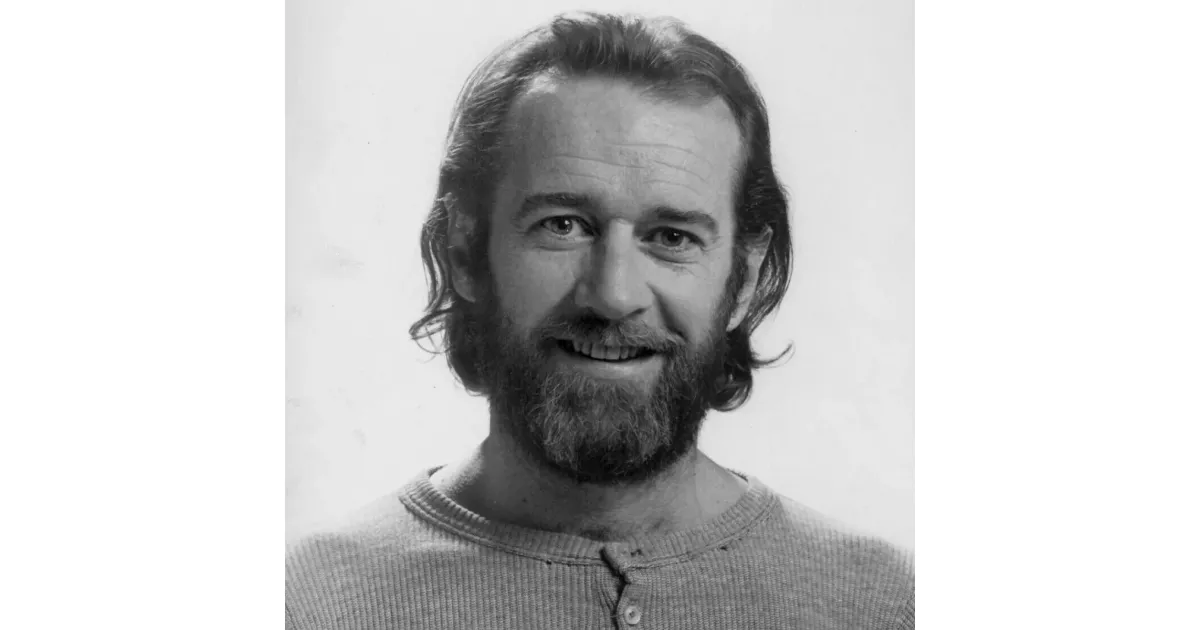George Carlin was a highly influential American stand-up comedian, social critic, actor, and author. Known for his dark humor, he fearlessly tackled controversial topics like politics, language, religion, and social taboos. His thought-provoking and often controversial comedy earned him the title of "the dean of counterculture comedians".
1931: Birth of Patrick Jr. Carlin
George Carlin's older brother, Patrick Jr. Carlin, was born in 1931.
May 12, 1937: Birth of George Carlin
George Carlin was born on May 12, 1937, in Manhattan, New York City.
1945: Death of Patrick John Carlin
George Carlin's father, Patrick John Carlin, died in 1945.
July 1956: Carlin Begins Working as a DJ at KJOE in Shreveport
George Carlin started working as a DJ at radio station KJOE in Shreveport, Louisiana, in July 1956.
July 29, 1957: Carlin Receives General Discharge from the Air Force
George Carlin received a general discharge from the U.S. Air Force on July 29, 1957.
1959: Carlin Meets Jack Burns in Fort Worth
George Carlin met Jack Burns in 1959 while working as a DJ at radio station KXOL in Fort Worth, Texas, forming a comedy duo.
February 1960: Burns and Carlin Move to California
Jack Burns and George Carlin moved to California in February 1960 to pursue their comedy careers.
May 1960: Burns and Carlin Record "Burns and Carlin at the Playboy Club Tonight"
In May 1960, Jack Burns and George Carlin recorded their only album together, "Burns and Carlin at the Playboy Club Tonight."
August 1960: Meeting Brenda Hosbrook
In August 1960, while on tour with his comedy partner, Jack Burns, in Dayton, Ohio, Carlin met Brenda Hosbrook, a waitress at a roadside diner. This chance encounter marked the beginning of their relationship.
June 3, 1961: Marriage to Brenda Hosbrook
George Carlin married Brenda Hosbrook on June 3, 1961, at her parents' residence in Dayton, Ohio.
June 15, 1963: Birth of Kelly Marie Carlin
On June 15, 1963, George Carlin and Brenda Hosbrook welcomed their only child, a daughter named Kelly Marie Carlin, who later pursued a career as a radio host.
1966: Carlin Releases Debut Album "Take-Offs and Put-Ons"
George Carlin released his first solo album, "Take-Offs and Put-Ons," in 1966.
1967: Carlin Releases Debut Album and Appears in "Away We Go"
George Carlin released his debut album "Take-Offs and Put-Ons" and appeared in the CBS comedy show "Away We Go" in 1967.
1970: Carlin Signs with Little David Records
In 1970, Monte Kay and Flip Wilson formed Little David Records, a subsidiary of Atlantic Records. They signed George Carlin, who was transitioning from RCA Records.
May 1971: Carlin Records at the Cellar Door
In May 1971, George Carlin recorded a performance at Washington, D.C.'s Cellar Door. This recording would later be released as the album "FM & AM."
January 1972: Release of "FM & AM"
January 1972 saw the release of George Carlin's album "FM & AM," a recording from his performance at the Cellar Door in Washington, D.C.
July 21, 1972: Carlin Arrested for "Seven Dirty Words" Routine
On July 21, 1972, Carlin faced arrest for his performance at Milwaukee's Summerfest. The charge was violating obscenity laws with his now-infamous "seven dirty words" routine.
1972: "FM & AM" Marks a Shift in Carlin's Style
1972 marked a turning point for Carlin with the success of "FM & AM." This album showcased his shift from mainstream comedy towards a more countercultural style, embracing topics like drug use and social commentary.
1972: Carlin Wins First Grammy Award for "FM & AM"
George Carlin won his first Grammy Award for Best Comedy Album for "FM & AM" in 1972.
1973: FCC Censors Carlin's "Filthy Words"
In 1973, Carlin's "Filthy Words" routine, broadcast on WBAI, sparked a complaint to the FCC. This incident led to a Supreme Court case, where the court upheld the FCC's authority to censor "indecent" material on public airwaves.
October 11, 1975: Carlin Hosts "Saturday Night Live" Premiere
On October 11, 1975, Carlin hosted the very first episode of NBC's "Saturday Night Live." He opted out of appearing in any sketches, focusing solely on his stand-up routine.
1975: Carlin Hosts First Episode of Saturday Night Live
In 1975, George Carlin hosted the first episode of the late-night comedy show, Saturday Night Live.
1976: Carlin Steps Back from Performing
At the height of his career in 1976, Carlin made the unexpected decision to reduce his performance schedule significantly, leaving fans curious about his sudden absence.
1977: Carlin's First HBO Specials
Carlin partnered with HBO in 1977, releasing his first two stand-up specials on the platform. This marked a shift towards cable television, which offered greater creative freedom.
1977: "George Carlin at USC" Premieres on HBO
George Carlin's first HBO stand-up comedy special, "George Carlin at USC," was filmed in 1977.
1978: Origin of the "Carlin Warning"
Following George Carlin's impactful "seven dirty words" routine and the subsequent Supreme Court ruling in FCC v. Pacifica Foundation in 1978, broadcasters began implementing a practice known as the "Carlin Warning." This warning served as a reminder to performers, particularly during live broadcasts, about words deemed inappropriate for broadcast television, highlighting Carlin's lasting impact on the world of comedy and freedom of speech.
1978: Carlin's Second HBO Special
Following the success of his first HBO special, Carlin released a second one in 1978, solidifying his presence on the platform.
1978: First Heart Attack
George Carlin experienced his first heart attack in 1978, marking the beginning of his decades-long struggle with heart problems.
1978: Carlin's "Seven Dirty Words" Routine Sparks Supreme Court Case
In 1978, George Carlin's "seven dirty words" routine was at the center of the landmark Supreme Court case F.C.C. v. Pacifica Foundation, regarding censorship on public airwaves.
1980: Hollywood Walk of Fame Star
George Carlin was honored with a star on the Hollywood Walk of Fame in 1980, recognizing his significant contributions to the entertainment industry.
1980: Beginning of Management with Jerry Hamza
In 1980, Jerry Hamza became George Carlin's manager, a role he held until Carlin's passing in 2008.
1981: Carlin Returns to Stand-Up
After a period of reduced performances, Carlin made a comeback to stand-up comedy in 1981. He released the album "A Place for My Stuff" and filmed a special for HBO.
1982: Carlin Expands "Dirty Words" Theme
Carlin continued expanding upon his controversial "dirty words" theme in 1982, even incorporating it into his HBO performances and creating an "Incomplete List of Impolite Words."
1982: "Carlin at Carnegie Hall"
Carlin's 1982 HBO special, "Carlin at Carnegie Hall," was recorded at the prestigious Carnegie Hall in New York City. This special further solidified his return to stand-up.
1982: Second Heart Attack
George Carlin had his second heart attack in 1982.
November 10, 1984: Carlin's Second Time Hosting "SNL"
Carlin returned to host "Saturday Night Live" for a second time on November 10, 1984. Unlike his first appearance, he participated in several sketches during this episode.
1984: Death of Mary Carlin
George Carlin's mother, Mary Carlin, passed away in 1984.
1987: Carlin's Breakthrough Film Role in "Outrageous Fortune"
Carlin's role in the 1987 comedy "Outrageous Fortune" marked a turning point in his film career, bringing him mainstream recognition beyond stand-up.
1989: Carlin Becomes "Rufus" in "Bill & Ted's Excellent Adventure"
Carlin landed the role of Rufus in the 1989 time-travel comedy "Bill & Ted's Excellent Adventure." The film's success introduced him to a younger audience.
1991: Carlin Joins "Shining Time Station" and "Thomas & Friends"
Expanding into children's entertainment, Carlin took on the roles of Mr. Conductor in "Shining Time Station" and the narrator for "Thomas & Friends," both in 1991.
1991: Carlin Stars in "The Prince of Tides"
In 1991, Carlin showcased his acting range in the drama "The Prince of Tides," starring alongside Nick Nolte and Barbra Streisand.
1991: Third Heart Attack
In 1991, George Carlin suffered his third heart attack.
1992: Carlin Wins Grammy Award for "Jammin' in New York"
In 1992, George Carlin received a Grammy Award for Best Comedy Album for "Jammin' in New York".
1993: "The George Carlin Show" Premieres
"The George Carlin Show," a sitcom created by Sam Simon, premiered in 1993. Carlin played the lead role of George O'Grady, a New York City taxi driver.
December 1995: "The George Carlin Show" Ends
Carlin's sitcom "The George Carlin Show" ended in December 1995 after two seasons. Though he expressed relief at its conclusion, he acknowledged the positive comedic environment during its run.
1996: Carlin Departs from "Thomas & Friends"
In 1996, after narrating the first four seasons of the US, Canada, and New Zealand version of "Thomas & Friends," Carlin concluded his time on the show.
May 11, 1997: Death of Brenda Hosbrook
Brenda Hosbrook, George Carlin's wife, passed away on May 11, 1997, due to liver cancer. Her death occurred just one day before Carlin's 60th birthday.
1997: Carlin Releases "Brain Droppings" and Honored at Aspen Comedy Festival
1997 marked the release of Carlin's first hardcover book, "Brain Droppings," which became a bestseller. That same year, he was celebrated at the Aspen Comedy Festival with a retrospective of his career.
June 24, 1998: Marriage to Sally Wade
On June 24, 1998, George Carlin married Sally Wade, a comedy writer, in a private ceremony that was not officially registered. The couple remained together until Carlin's death in 2008.
2001: "Brain Droppings" Earns Carlin a Grammy Award
George Carlin's album "Brain Droppings" won a Grammy Award for Best Comedy Album in 2001.
2001: Lifetime Achievement Award
In 2001, George Carlin was honored with a Lifetime Achievement Award at the 15th Annual American Comedy Awards.
2001: Carlin's Reflection on Career Choices
In a 2001 Esquire magazine interview, George Carlin discussed choosing stand-up comedy over acting, attributing the decision partly to financial challenges caused by past drug abuse. He acknowledged his financial struggles, including substantial debt to the IRS, which took him nearly two decades to resolve. Carlin emphasized his commitment to fulfilling his tax obligations and expressed no resentment towards the IRS, recognizing his role in the situation. He believed that this experience ultimately benefited his comedic career. The financial constraints forced him to focus on stand-up comedy, which led to significant growth as a comedian and writer. He acknowledged that pursuing a movie career might not have been as fulfilling, implying that focusing on stand-up allowed him to hone his craft and achieve greater success.
2002: Carlin Receives Grammy Award for "Napalm & Silly Putty"
George Carlin won a Grammy Award in 2002 for Best Comedy Album for "Napalm & Silly Putty".
December 2003: Introduction of Bill H.R. 3687
In December 2003, Representative Doug Ose proposed a bill (H.R. 3687) aiming to prohibit the broadcast of Carlin's "seven dirty words." This bill extended to various grammatical forms and combinations of these words. It omitted "tits" but included "asshole," which was not part of Carlin's original seven words.
2003: Arrhythmia and Ablation Procedure
In 2003, George Carlin underwent an ablation procedure to address an arrhythmia, a heart rhythm disorder.
January 2004: Bill H.R. 3687 Tabled
In January 2004, the H.R. 3687 bill, intended to outlaw the broadcast of Carlin's "seven dirty words", was referred to the House Judiciary Subcommittee on the Constitution but did not progress further and was tabled.
2004: Carlin Ranked Second on Comedy Central's Top 10 American Comedians
Comedy Central ranked George Carlin as the second best American Comedian on their 2004 list.
2004: Altercation with Audience and Termination from MGM Grand Las Vegas
In 2004, Carlin's run at the MGM Grand Las Vegas ended abruptly due to a confrontation with the audience during a performance. Following a poorly received set marked by dark humor, Carlin expressed frustration and criticized the audience, questioning their intelligence for traveling to Las Vegas and financially supporting large corporations. He called those who were offended "people with very limited intellects." His comments were met with disapproval, and when an audience member interjected, Carlin responded with sarcasm, further escalating the situation. This incident resulted in his immediate dismissal from the venue. Subsequently, his representative disclosed that Carlin had decided to seek treatment for alcohol and prescription painkiller addiction.
2004: Rehab Stint and Journey to Sobriety
In 2004, George Carlin spent time in a rehabilitation facility as part of his efforts to address his addiction issues. Later, during the taping of his stand-up special "Life Is Worth Losing" on November 5, 2005, he shared with the audience that he had maintained sobriety for 341 days. This public acknowledgment of his sobriety journey resonated with many, highlighting the ongoing nature of recovery.
November 5, 2005: Life Is Worth Losing HBO Special Premiere and Tour
Following the debut of his 13th HBO special, "Life Is Worth Losing," on November 5, 2005, George Carlin embarked on a tour in the first half of 2006 to perform his new material.
2005: Significant Heart Failure Episode
George Carlin experienced a severe episode of heart failure in 2005.
2006: Touring and Health Challenges
Throughout the first half of 2006, George Carlin toured with his new material, which explored themes such as suicide, natural disasters, cannibalism, genocide, human sacrifice, threats to civil liberties in America, and his perspective on the inferiority of humans compared to other animals. During the initial stop of his tour in February at the Tachi Palace Casino in Lemoore, California, Carlin revealed that this performance marked his return to the stage after being hospitalized for six weeks due to heart failure and pneumonia. In a lighter vein, 2006 saw Carlin lend his voice to the animated Pixar film "Cars," where he voiced Fillmore, an anti-establishment hippie VW Microbus adorned with psychedelic paint and the license plate "51237," a nod to Carlin's birthday.
2007: Voice Acting in Happily N'Ever After
In 2007, George Carlin provided the voice for the wizard character in the animated film "Happily N'Ever After." This marked his final film role.
March 1, 2008: It's Bad for Ya HBO Special Premiere
George Carlin's final HBO stand-up comedy special, titled "It's Bad for Ya," aired live on March 1, 2008, from the Wells Fargo Center for the Arts in Santa Rosa, California. In this special, Carlin delved into themes including "American bullshit," individual rights, death, aging, and child-rearing. He frequently emphasized the phrase "It's all bullshit, and it's bad for ya" throughout the performance, reinforcing his skeptical and cynical worldview.
June 22, 2008: Death of George Carlin
George Carlin passed away on June 22, 2008.
November 10, 2008: Posthumous Mark Twain Prize
On November 10, 2008, George Carlin was posthumously awarded the Mark Twain Prize for American Humor, a testament to his enduring impact on comedy. Several renowned comedians participated in the ceremony, celebrating his contributions to the field.
2008: Death of George Carlin
George Carlin passed away in 2008.
2008: Carlin Receives Posthumous Mark Twain Prize for American Humor
George Carlin was posthumously awarded the Mark Twain Prize for American Humor in 2008.
2008: Release of "It's Bad For Ya!"
In 2008, Carlin released "It's Bad For Ya!," another successful stand-up special that aired on HBO.
2008: Announcement of "A Carlin Home Companion"
In 2008, Carlin's daughter, Kelly, revealed plans for "A Carlin Home Companion," an autobiographical one-woman show reflecting on her experiences growing up with her father. The project offered a personal perspective on the legendary comedian.
2008: Mark Twain Prize for American Humor
In 2008, George Carlin received the prestigious Mark Twain Prize for American Humor from the John F. Kennedy Center for the Performing Arts, a testament to his enduring legacy as a comedic icon.
2008: Carlin's Final Comedy Special "It's Bad for Ya" and Death.
In 2008, George Carlin released his final comedy special, "It's Bad for Ya." He sadly passed away later that year.
2008: Posthumous Recognition and Tributes
In 2008, following George Carlin's death, numerous tributes were held in his honor. HBO aired a marathon of his stand-up specials, and Sirius XM launched a dedicated channel, "Carlin's Corner," featuring his work. Talk shows, newspapers, and comedians paid their respects, solidifying his legacy in the entertainment industry.
2008: Openness About Substance Use and Sobriety
In a 2008 interview, George Carlin openly discussed his experiences with various substances, including cannabis, LSD, and mescaline, stating that they provided him with a means of coping with personal challenges. He also acknowledged his past struggles with addiction to alcohol, cocaine, and Vicodin. Carlin's willingness to discuss these personal battles contributed to a broader conversation about addiction and recovery.
2009: Publication of Carlin's Autobiography, "Last Words"
George Carlin's autobiography, "Last Words," was published posthumously in 2009. Edited by Tony Hendra, it provides insights into Carlin's life, career, and the creative process behind his stand-up routines.
March 2011: Publication of "The George Carlin Letters: The Permanent Courtship of Sally Wade"
March 2011 saw the release of "The George Carlin Letters," a collection of Carlin's writings and artwork compiled by his widow, Sally Wade. The book offers an intimate glimpse into their relationship and his creative process.
2011: Reference in "Weird Al" Yankovic's Song
"Weird Al" Yankovic's 2011 song "Stop Forwarding That Crap to Me" humorously addresses the phenomenon of misattributed quotes, even referencing Carlin, highlighting the comedian's enduring presence in online culture.
October 22, 2014: Street Renaming to Honor Carlin
A section of West 121st Street in Manhattan, where Carlin spent his childhood, was renamed "George Carlin Way" on October 22, 2014, a tribute to his lasting impact on comedy and his connection to the city.
2017: Rolling Stone Ranks Carlin Second on "50 Best Stand-Up Comics of All Time" List
Rolling Stone magazine positioned George Carlin second on their "50 Best Stand-Up Comics of All Time" list in 2017.
October 2018: Announcement of Carlin Biopic
The announcement of a George Carlin biopic in October 2018, to be written by Stan Chervin, signaled a continued interest in exploring and celebrating the comedian's life and legacy on the big screen.
May 2022: Induction into the National Comedy Center
In May 2022, George Carlin was posthumously inducted into the National Comedy Center, as part of Netflix's stand-up special "The Hall: Honoring the Greats of Stand-Up," solidifying his place among the most celebrated figures in comedy history.
2022: Kelly Carlin on Her Father's Acting Aspirations
In 2022, Kelly Carlin, George Carlin's daughter, revealed that her father took on more acting roles in the latter part of his career because he "never gave up on the Danny Kaye dream." This insight suggests that Carlin, despite achieving substantial success in stand-up comedy, retained a fondness for acting and drew inspiration from comedic actors like Danny Kaye.
2022: Death of Patrick Jr. Carlin
Patrick Jr. Carlin, George Carlin's older brother, passed away in 2022.
2022: Documentary Reveals Carlin's Health Struggles
The 2022 documentary "George Carlin's American Dream" shed light on the extent of Carlin's heart problems, particularly towards the end of his life. Jerry Hamza, his longtime manager, shared an anecdote revealing that Carlin had undergone numerous heart surgeries within a short period. Hamza recounted a poignant moment when Carlin showed him his torso, which bore the marks of multiple procedures, prompting Hamza to remark that it resembled an experiment.
Mentioned in this timeline
Home Box Office HBO is an American pay television service...

John F Kennedy JFK was the th U S President...
CBS Broadcasting Inc CBS is a prominent American commercial broadcast...

Wells Fargo Company is a multinational financial services institution operating...
California is a U S state on the Pacific Coast...
Saturday Night Live SNL is a late-night live sketch comedy...
Trending

11 months ago Alex Sarr Shines as Wizards Beat Pistons: Sarr's 19 Points Not Enough
3 months ago Rutgers Student Critically Injured at Fraternity House: Investigation Underway, Safety Concerns Raised.

2 months ago Ryan Seacrest's Impressive Workout: Biceps Bulge Surprises Fans After Hollywood Exit

10 months ago Lily Collins Shares Adorable Dance Party with Daughter Tove and Celebrates First Birthday as Mom.

10 months ago Caitlin Clark, Serena Williams at NFL Meeting; Flag Football for LA28.
8 months ago Queens 10K Returns: Race, Festival, Kids Run & Community Engagement in 2025
Popular

Thomas Douglas Homan is an American law enforcement officer who...

William Franklin Graham III commonly known as Franklin Graham is...

XXXTentacion born Jahseh Dwayne Ricardo Onfroy was a controversial yet...

Jupiter is the fifth and largest planet from the Sun...

Instagram is a photo and video-sharing social networking service owned...

KFC or Kentucky Fried Chicken is an American fast-food chain...
